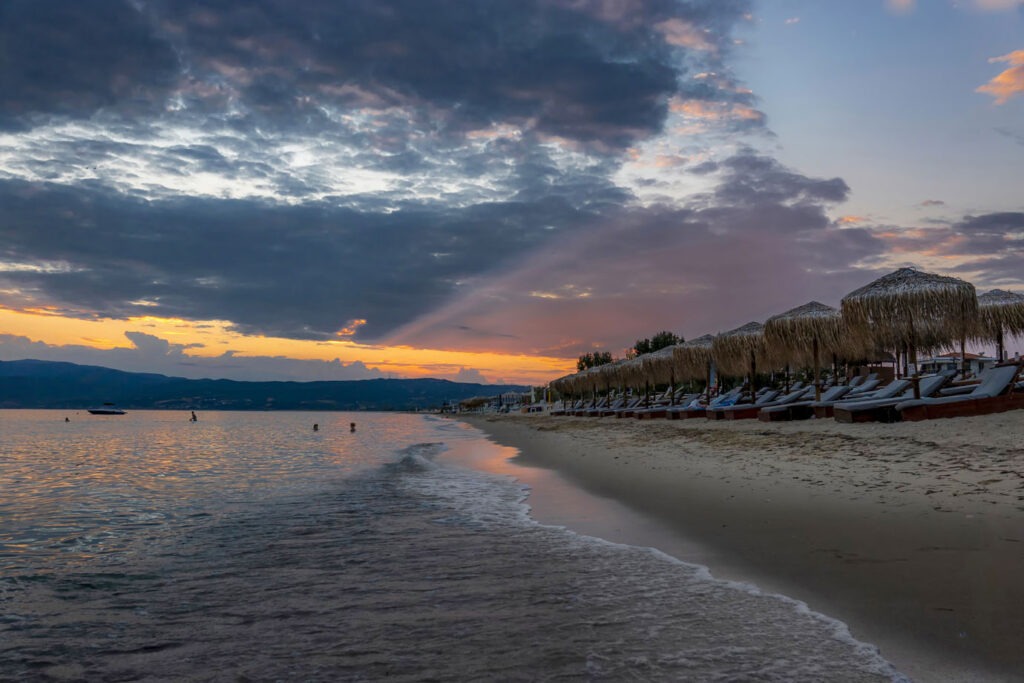Ofrynio is famous for its long beach of about 17km.
The place is ideal for families as it has a popular children's center. However, couples love this beach too, as there are plenty of romantic cafes and cocktail bars where you can enjoy a drink on the beach while watching the sunset.
If you're planning to stay for many days, here is all you need to know to explore the prefecture of Kavala city.
- Kavala - Panagia quarter
The oldest part of Kavala takes its name from the Panagia church. You can enjoy a stroll around its winding streets lined by pastel-colored houses under the protective guard of the 15th the century Kastro (castle) with its sturdy crenelated fortress walls—you can even walk up the narrow staircase of the inner round tower for a spectacular 360-degree city and sea view. The neighborhood around it is a melting pot of Mediterranean cultural heritage, with a mix of Macedonian architecture and Eastern influences. The beautiful Halil Bey Mosque has a distinctive ruby-colored facade. Nearby is the Mohamed Ali House, the former home of the Pasha Mehmet Ali and one of Greece's best surviving examples of 18th-century Ottoman architecture. The museum displays Ottoman wood carvings, rugs and swords inside the two-story house. With its 18 graceful domes, the Imaret was built as the Pasha's seminary for students of Islamic theology back in 1817.
- Kavala - The Kamares arches
The ancient Roman military road known as the Via Egnatia ran right through Kavala, making the city a commercial centre in late antiquity. In the Middle Ages, the aqueduct that the Romans had built first, was expanded under the rule of Suleiman the Magnificent. The steadfast Ottoman engineering helped ensure the aqueduct's place as a city landmark today; with its sixty arches of four different sizes and a height of 52 meters (nearly 175 feet.
- Daily cruising in Thassos and Kavala
There are plenty of companies offering cruises around Kavala and the island of Thasos. Choose the company and the type of cruise you like and spend a day on a boat enjoying the crystal-clear blue waters of the north Aegean Sea.
- Philippi
The ancient city of Philippi was founded in 360 BC by colonists from Thassos and called Krenides (meaning "springs"). In 356 BC, it was conquered by King Philip II of Macedon, the father of Alexander the Great, and renamed Philippi. The presence of gold mines nearby only added to the town's strategic importance. It commanded a principal trade route between Europe and Asia and flourished even more in the Hellenistic period that followed Alexander's death. Later, in the 2nd century BC, the Via Egnatia Roman military road passed the city through. In 42 BC, the stage was set for the Battle of Philippi that pitted Mark Antony and Octavian against generals Brutus and Cassius, the leaders of Julius Caesar's assassination two years earlier. The epic battle involved some 200,000 men and left the Second Triumvirate in charge of Rome. The site's prominence persisted through subsequent Byzantine and post-Byzantine Christian periods, accounting for the palimpsest of stone remnants (including relief decorations from the time of Philip II) that visitors walk amongst today. Highlights include the Hellenistic theatre, set dramatically against the hill, the forum, and evocative ruins of the basilicas that rose here once Philippi became an important center of early Christianity. It was in Philippi that the first European Christian, Lydia of Thyatira, was baptized by Apostle Paul in 49A in the River Zygaktis. There's a very worthwhile museum too, where more delicate finds are displayed, and the story of Philippi can be better understood in the context of this fascinating corner of Greece.
- Baptistery of St Lydia
Located 15 km from the city of Kavala and next to the archaeological site of Philippi. There, in the river Zygakti, is the point where the Apostle Paul baptized the first Christians of Europe, Lydia. There is now a church a few steps away from the river. The place is often visited by tourists who visit the broader area of Philippi.
- Summer fun
For summer activities such as free fall, surfing, horse-riding, enduro routes etc. you can read our article here (just put the link)
- Festival of Philippi
If you happen to visit the area in summer and you know Greek, then you should 'google' the Philippi Festival, which is organized annually. This festival hosts many ancient Greek dramas and music concerts by popular Greek singers/musicians. The events take place at the ancient theatre of Philippi. So actually, many tourists visit the events even if they don't speak the language (especially the music events).
Have a wonderful stay at Ofrynio!



